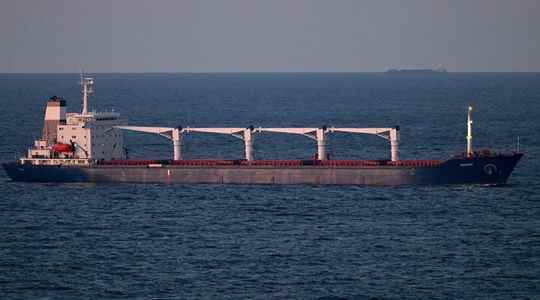It is called the “Razoni”. A team of Russian and Ukrainian officials are due to inspect, on Wednesday, near Istanbul (Turkey), this cargo ship containing the first shipment of grain exported by Ukraine since the start of the Russian invasion on February 24. In addition, the situation is “volatile” at the Zaporijjia nuclear power plant, which has been under Russian control since the beginning of March, the director general of the International Atomic Energy Agency (IAEA) expressed concern on Tuesday, August 2, who continues its efforts to send a mission there.
- The first grain load awaiting inspection near Istanbul
A team of Russian and Ukrainian officials must inspect, this Wednesday August 3 near Istanbul, the first shipment of cereals exported by Ukraine since the beginning of the Russian invasion, in application of the agreement signed last July between kyiv and Moscow to stem the global food crisis.
The ‘Razoni’, a freighter flying the flag of Sierra Leone, came into sight of the northern shores of Istanbul on the Black Sea on Tuesday after leaving the Ukrainian port of Odessa on Monday with 26,000 tonnes of maize to destination of Tripoli in Lebanon. The ship is inspected this Wednesday morning by a joint team of Russian and Ukrainian officials at the entrance to the Bosphorus, in accordance with Russia’s wish to ensure the nature of the cargo, said the Turkish Ministry of Defense.
Cereals have already left Ukraine since the start of the Russian offensive, but from Berdiansk (southeast), on the Sea of Azov, an area occupied by the Russians. Monday, August 1, UN Secretary General Antonio Guterres had “warmly” welcomed the departure of the “Razoni”, expressing the hope that the resumption of Ukrainian exports, permitted by an international agreement, “will bring stability and help essential to global food security”.
According to the head of Ukrainian diplomacy Dmytro Kouleba, 16 other boats loaded with grain are “waiting their turn” to leave Odessa, the main Ukrainian port located on the Black Sea, which before the war concentrated 60% of the country’s port activity.
- Zaporijjia power plant: the situation is “volatile”, according to the IAEA
The situation is “volatile” at the Zaporijjia nuclear power plant, under Russian control since the beginning of March, the director general of the International Atomic Energy Agency (IAEA) said on Tuesday.
“All the security principles have been violated in one way or another. And we cannot allow this to continue”, declared Rafael Grossi on the occasion of a conference of the 191 States signatories of the treaty on the non – proliferation of nuclear weapons (NPT). At the opening of the meeting on Monday, he had already stressed that the situation was becoming “more and more dangerous day by day”.
Hence his efforts for weeks to send a mission to inspect the plant. This has so far been refused by Ukraine, which considers that this would legitimize the Russian occupation of the site in the eyes of the international community, the Ukrainian operator Energoatom explained a few weeks ago.
“Going there is very complex because it requires the agreement and cooperation of a number of actors”, in particular Ukraine and Russia, and the support of the United Nations, being an area of war, Rafael Grossi noted on Tuesday. “I try to set up a mission as quickly as possible,” he said. In 2021, the plant provided 20% of Ukraine’s annual electricity production and 47% of that produced by the Ukrainian nuclear fleet.
- Washington announces new salvo of sanctions against Russian oligarchs and companies
The United States announced on Tuesday new economic sanctions against companies andRussian oligarchs close to President Vladimir Putin. “Putin’s allies got rich and funded opulent lifestyles,” US Treasury Secretary Janet Yellen said in the statement.
Joe Biden’s minister assures that the Treasury “will use all the tools at its disposal to ensure that Russian elites and Kremlin supporters are held accountable for their complicity in a war that has cost countless lives”. The Treasury Department’s Office of Foreign Assets Control (OFAC) has thus frozen the assets of Andrey Guryev, founder of the fertilizer company Phosagro, “close associate” of Vladimir Putin and former member of the Russian government. The oligarch owns the Witanhurst Mansion, London, the second largest private residence in London, after Buckingham Castle. He had already been sanctioned by the United Kingdom.
- Ukrainian Azov regiment designated “terrorist organization” by Russian justice
The Russian Supreme Court on Tuesday classified the Ukrainian Azov regiment as a “terrorist organization”, which could lead to very heavy prosecutions for its fighters taken prisoner by Russia. Under Russian law, in fact, the leaders of a terrorist organization risk 15 to 20 years in prison, their simple members between five and ten years.
Quoted by the public news agency TASS, a judge of the Supreme Court declared “to satisfy the administrative request of the General Prosecutor’s Office, to recognize the Ukrainian paramilitary unit ‘Azov’ as a terrorist organization and to prohibit its activities” in Russia. She clarified that this decision came into effect immediately.
On Telegram, an adviser to Ukrainian President Volodymyr Zelensky, Mykhailo Podoliak, reacted on Tuesday evening by assuring that “any decision of the Russian courts concerning the war in Ukraine and on the territory of Ukraine is not legitimate from the point of view of the international law”. “In any case,” he added, “Russia will bear direct legal responsibility for the mistreatment of prisoners of war.”
The Azov regiment, a unit created in 2014 by volunteers, then integrated into the Ukrainian regular army, distinguished itself by defending the port city of Mariupol, in the south-east of Ukraine, conquered by Russia after a headquarters for several months.
